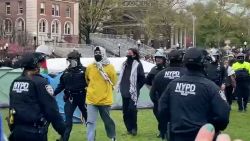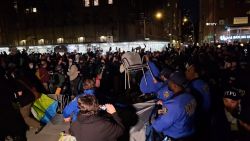Several members of the Supreme Court expressed concern over allegations of racial bias in the jury selection system on Wednesday in a case concerning a Mississippi death row inmate who was tried six times for murder.
The case even prompted Justice Clarence Thomas, who rarely speaks during oral arguments, to ask a question.
The inmate, Curtis Flowers, wants his conviction overturned because he argues the prosecutor behind each trial engaged in racial discrimination when striking jurors.
The justices dug into the particulars of the case and the reasons the prosecutor gave for removing jurors – so-called “peremptory challenges” that allow a lawyer to strike a prospective juror without articulating a specific reason. In 1986, the Supreme Court ruled that such challenges cannot be made on the basis of race.
Justice Samuel Alito referred to what he called the “unusual” and “disturbing history” of the prosecutor who, after the first two trials, struck all 10 prospective black jurors and was cited twice in the previous cases for improperly using race to strike jurors. Alito suggested that the history couldn’t be untangled from the sixth sentence that condemned Flowers to death.
Justice Elena Kagan said that the number of questions the prosecutor asked of African-American jurors was “staggering” when compared to the number of questions he asked of white jurors. Justice Sonia Sotomayor seemed incredulous that the prosecutor was allowed to continue trying the case despite what she called his “passion for the case.”
Supporters of Flowers say the Supreme Court needs to add teeth to the decision – called Batson v. Kentucky – because prosecutors can get around it by simply supplying race neutral justifications while building mostly white jurors. They say the court should take a harder look at the proffered justifications while also considering a prosecutor’s history of discrimination when deciding whether he illegally attempted to strike African-Americans from the jury pool.
Thomas, near the end of the argument session, asked a lawyer for Flowers whether his side had exercised any peremptory challenges.
“Were any peremptories exercised by the defendant?” Thomas asked, “and what was the race of the jurors struck there?”
While it seemed a majority of the court was prepared to rule in favor of Flowers, it was less clear how broadly the court could go to issue an opinion that could impact other cases in the future.
Chief Justice John Roberts suggested the court had granted the case because the lower courts had failed to take into account the prosecutor’s actions during all the trials, not just the last one that ended in a conviction that was upheld by the Mississippi Supreme Court.
Roberts wanted to know what kind of role a prosecutor’s prior history of discrimination should play in the current case.
Six trials
“Far too often, prosecutors get away with discriminatory jury strikes because courts blindly accept their pretextual justifications at face value,” said Chris Kemmitt, a lawyer for the NAACP Legal Defense Fund who has filed a brief in support of Flowers.
The dispute at hand centers upon the state’s lead prosecutor, Doug Evans, who represented the state during all six trials even though there was no physical evidence to prove Flowers committed the crime.
“Evans’ history of striking black panelists in the Flowers trials – including the most recent one – is lengthy and stark, and his conduct before the trial court below bears numerous hallmarks of a prosecutor still bent on seating as few black jurors as possible,” Flowers’ lawyer, Sheri Lynn Johnson of Cornell Law School, wrote in court briefs. She noted that the first four times Evans prosecuted Flowers he “struck every black panelist that he could, 36 in all.”
At the first two trials, Flowers contends the state peremptorily struck all 10 prospective black jurors. Those cases ended in convictions that were later reversed by the Mississippi Supreme Court. The state high court held that Flowers’ right to a fair trial had been violated.
After a third trial, and another conviction, the state Supreme Court again reversed holding that the state had engaged in racial discrimination during jury selection.
The fourth and fifth trials ended in a hung jury.
Finally, in June of 2010, Montgomery County hosted Flowers’ sixth trial. A jury of 11 white members and one African-American found Flowers guilty on four counts of capital murder and sentenced him to death for the murders of Bertha Tardy, Robert Golden, Carmen Rigby and Derrick Stewart, all of whom were shot in the head.
“At the sixth trial, Evans accepted the first black panelist, then struck the remaining five, proffering facially neutral reasons for his strikes that the Mississippi Supreme Court sanguinely accepted,” Johnson wrote.
“Examination of the cumulative evidence of racial motivation in light of Evans’ history compels the conclusion that race, once more, was the determining factor in both his questioning and his strikes,” Johnson added.
Under Batson, the Supreme Court devised a three part standard. If a defendant challenges a peremptory strike, the defendant must establish a plausible case of discrimination. After that, it is up to the state to demonstrate that the prosecutor had race neutral reasons to strike the jurors. Finally, the defendant can challenge that reasoning.
The Supreme Court of Mississippi, in affirming the conviction of capital murder, held that Flowers was asking it to “re-evaluate the credibility of Evans’s race neutral explanations for striking African Americans” in the sixth trial. The court said that the trial court had considered the “totality of the circumstances” including alleged “historical evidence of racial discrimination” by the district attorney.
The state Supreme Court held that while, overall, the state did “ask more questions of African-American jurors than potential white jurors” it could not “conclude that the trial court’s factual findings were clearly erroneous.”
The Court detailed the circumstances around several of the strikes. In one, for example, the court said that one black juror was struck because she had been sued by the furniture store, another was struck because she had worked with Flowers’ father and sister. Another because she told the court that Flowers was her “sister-in-law’s sister’s son.”
Mississippi’s Attorney General, Jim Hood, argued in court papers that the state “did not engage in racial discrimination during jury selection” and that Flowers’ rights were not violated as the result of racial bias.
“The states’ explanation’s” for the strikes were “race neutral and were not the product of pretext,” Hood argued.
In briefs, Hood detailed the strikes of African Americans and concluded that “none of the white jurors” had worked with a member of Flowers’ family, or were related by blood or marriage to him. None waffled on the application of the death penalty and none “lied about their work relationship with a member of Flowers’ family.”
Hood said that the Mississippi Supreme Court had engaged in a “painstaking analysis” of the trial court’s detailed findings and found no evidence that the Batson ruling had been violated.
Kemmitt hopes the Supreme Court will issue a broad ruling that will have nationwide implications.
“The stakes are much higher than just Mr. Flowers case, because if the test for identifying jury discrimination is something that Doug Evans can pass despite his flagrant history of discrimination, it’s hard not to conclude that the test is fundamentally broken,” he said.
Back in 1986, when the Supreme Court decided Batson, Thurgood Marshall– the Court’s first African-American justice who as a young lawyer traveled the country to successfully argue civil rights cases – praised his colleagues for taking a “historic step toward eliminating the shameful practice of racial discrimination in the selection of juries.”
But Marshall said in a concurring opinion that the decision would not end discrimination.
“Misuse of the peremptory challenge to exclude black jurors has become both common and flagrant,” he said. He added that the only way to fix the problem would be to get rid of peremptory challenges all together.
No other justice joined him.

















